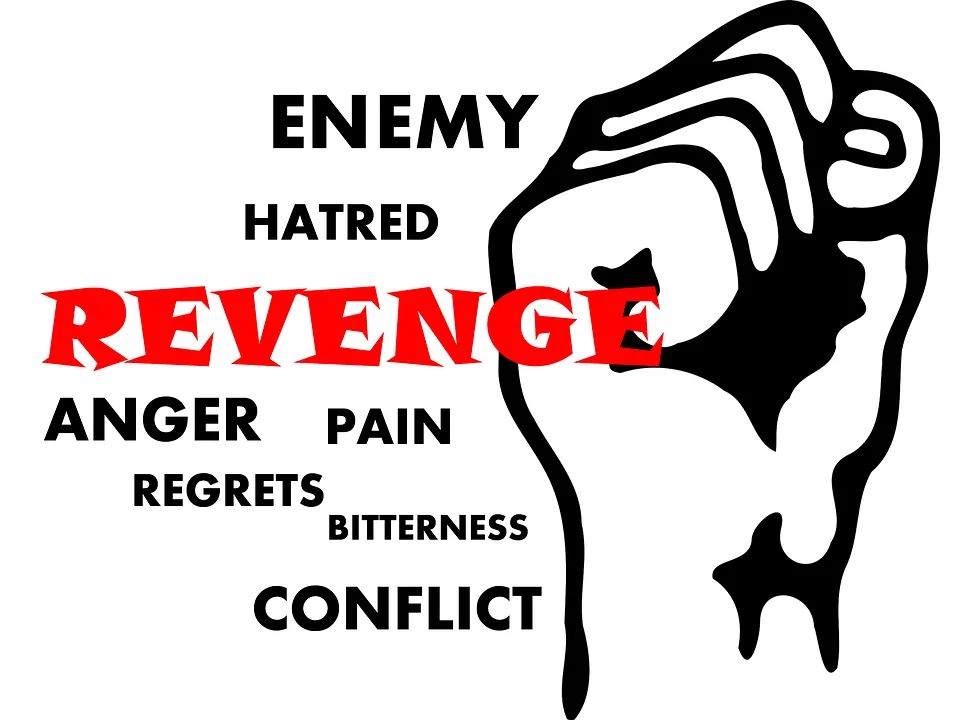Hate is an all-too-common and destructive emotion that many of us experience in life. Understanding how to handle and overcome hate is fundamental to our spiritual growth. What does the Bible say about hate? In this article, we will explore biblical perspectives on hate, sins in the Bible, and biblical solutions to transform hate into love. Keep reading to discover more about this fascinating and important topic.
Hate in the Bible: Overview of Scriptures
As a Christian, it’s essential to know what God’s perspective is on hate to avoid falling into the trap of this powerful emotion. Fortunately, the Bible has many Scriptures that deal with this topic. Here’s an overview of some of the key ones:
Hating What is Evil: Romans 12:9 says, “Hate what is evil; cling to what is good.” This Scripture suggests that while hating isn’t always right, there is a time to hate. We should hate anything that is contrary to God’s nature and cling to that which aligns with it.
Love versus Hate: In 1 John 4:20, it says, “Whoever claims to love God yet hates a brother or sister is a liar. For whoever does not love their brother and sister, whom they have seen, cannot love God, whom they have not seen.” This Scripture establishes that loving others is essential to loving God, and if we hate our brothers and sisters in Christ, we are not loving God.
The Ten Commandments and Hate: One of the ten commandments is, “You shall not murder” (Exodus 20:13). This commandment prohibits us from committing murder, which is the ultimate act of hatred.
God’s Wrath Against Hate: In Proverbs 6:16-19, it says, “There are six things the Lord hates, seven that are detestable to him: haughty eyes, a lying tongue, hands that shed innocent blood, a heart that devises wicked schemes, feet that are quick to rush into evil, a false witness who pours out lies, and a person who stirs up conflict in the community.” This Scripture reveals that God hates anything that harms His people, including hate.
The Golden Rule and Hate: In Matthew 7:12, Jesus says, “So in everything, do to others what you would have them do to you, for this sums up the Law and the Prophets.” This Scripture highlights the importance of treating others the way we want to be treated and not hating anyone.

By understanding these Scriptures and applying them to our lives, we can avoid falling into the trap of hate and instead, live a life based on love and compassion towards others.
Jesus’ Teachings on Love and Hate

In the New Testament, Jesus frequently teaches about love and hate. One of the most well-known teachings is the command to “love your neighbor as yourself” (Mark 12:31, NLT). This commandment appears in both the Old Testament (Leviticus 19:18) and the New Testament, emphasizing God’s unwavering belief in the importance of love.
Jesus also teaches that love goes beyond just loving those who are good to us. He says, “If you love those who love you, what reward will you get? Are not even the tax collectors doing that?” (Matthew 5:46, NIV). Jesus calls us to love even our enemies, stating “love your enemies and pray for those who persecute you” (Matthew 5:44, NIV).
Hate is not something that Jesus condones, and he teaches against it. He says, “But I say, if you are even angry with someone, you are subject to judgment! If you call someone an idiot, you are in danger of being brought before the court. And if you curse someone, you are in danger of the fires of hell” (Matthew 5:22, NLT). This shows that Jesus emphasizes the importance of avoiding hate and anger, which can lead to harmful behavior and speech.
Jesus also emphasizes forgiveness when dealing with hate. He says, “For if you forgive other people when they sin against you, your heavenly Father will also forgive you. But if you do not forgive others their sins, your Father will not forgive your sins” (Matthew 6:14-15, NIV). Forgiveness can help us release the anger and hurt associated with hate and promote healing and growth.
Overall, Jesus’ teachings highlight the importance of love over hate. He teaches us to love not just those who love us but also our enemies, to avoid hate and anger, and to practice forgiveness. These teachings help us foster healthy relationships with others and promote peace and harmony in our communities.
Hate as a Sin in the Bible
As a Christian, understanding God’s view on hate is essential in living a life that reflects His love. The Bible is clear on the fact that hate is a sin, and it has dire consequences. Here are some biblical teachings on hatred and sin:
1 John 2:9-11 says, “Anyone who claims to be in the light but hates a brother or sister is still in the darkness. Anyone who loves their brother and sister lives in the light, and there is nothing in them to make them stumble. But anyone who hates a brother or sister is in the darkness and walks around in the darkness. They do not know where they are going because the darkness has blinded them.” This scripture emphasizes that hate is the opposite of love and that those who choose to hate are in the darkness and do not know where they are going.
Matthew 5:21-22 states, “You have heard that it was said to the people long ago, ‘You shall not murder, and anyone who murders will be subject to judgment.’ But I tell you that anyone who is angry with a brother or sister will be subject to judgment. Again, anyone who says to a brother or sister, ‘Raca,’ is answerable to the court. And anyone who says, ‘You fool!’ will be in danger of the fire of hell.” In this scripture, the Bible equates being angry with someone to the sin of murder, emphasizing the severity of harboring hate in our hearts.
Galatians 5:19-21 lists hate as one of the works of the flesh, along with other sins such as sexual immorality, idolatry, and drunkenness. It says, “The acts of the flesh are obvious: sexual immorality, impurity and debauchery; idolatry and witchcraft; hatred, discord, jealousy, fits of rage, selfish ambition, dissensions, factions and envy; drunkenness, orgies, and the like. I warn you, as I did before, that those who live like this will not inherit the kingdom of God.” This scripture emphasizes that hate is not only a sin, but it is also one of the works of the flesh that can hinder our salvation.
Although it is clear that hate is a sin and has grave consequences, the Bible also offers solutions to overcome hate. Here are some practical tips for dealing with hate biblically:
- Love your enemies (Matthew 5:44)
- Do not repay evil with evil (Romans 12:17)
- Overcome evil with good (Romans 12:21)
- Forgive those who have wronged you (Colossians 3:13)
- Love covers a multitude of sins (1 Peter 4:8)
In conclusion, hate is a sin according to the Bible, and it has severe consequences. However, the Bible also offers practical solutions to overcome hate through the power of God’s love. As Christians, let us strive to love one another, even our enemies, and overcome hate with good.
Dealing with Hate According to the Bible
When it comes to dealing with hate, the Bible teaches us to rely on love instead. In fact, the Bible goes so far as to say that if we claim to love God, but hate our brothers and sisters, we are liars. (1 John 4:20)
So, how do we deal with hate the Bible’s way? The first step is to examine our own hearts. We must be honest about our own prejudices and biases, and be willing to confront them head-on. Only then can we truly love our neighbor and see them as God sees them.

Another important step is forgiveness. Jesus teaches us to forgive those who have wronged us, not just once, but seventy times seven. This doesn’t mean that we should condone harmful behavior or allow others to continue hurting us. But it does mean that we should let go of our anger and bitterness, and try to see the good in others.
We should also strive to be peacemakers, instead of creating more conflict. Jesus blesses us when we work for peace, and says that the peacemakers will be called children of God. (Matthew 5:9) This means that we should seek to resolve our differences through compassion, kindness, and understanding.
Finally, we must always remember that hate is a sin. Just as lying, stealing, and cheating are sins, so too is hate. When we hate others, we are disobeying God’s command to love our neighbor as ourselves. We must confess our hate to God, and ask for His forgiveness and help in overcoming it.
Dealing with hate is not easy, but with God’s help, it is possible. If we strive to love our neighbor, forgive those who have wronged us, be peacemakers, and avoid sin, we can overcome hate and live in harmony with one another.
Biblical Examples and Consequences of Hate
As you delve deeper into the topic of hate in the Bible, it’s important to see how it is portrayed in various stories and scriptures. The consequences of hate can be severe and it is important to understand why it’s important to overcome hate. Here are some biblical examples of hate and their consequences:
Cain and Abel – The story of these two brothers is one of the most well-known examples of hate in the Bible. Cain was jealous of Abel’s relationship with God and in a fit of rage, killed him. Because of this, Cain was cursed and suffered a life of wandering and restlessness.
Haman and Mordecai – In the book of Esther, Haman hates Mordecai because he refuses to bow down to him. Haman plots to kill Mordecai and all the Jews in the land, but ultimately his plan fails and he is executed.
The Pharisees and Jesus – The Pharisees, religious leaders of the time, hated Jesus because he spoke out against their hypocrisy and challenged their authority. They plotted to kill him, which ultimately led to his crucifixion.
These stories show that hate can lead to destructive behavior and consequences. It is important to understand that hate is not from God, and can lead us away from him.
So how can we overcome hate and its consequences? The Bible provides several solutions:
Love your enemies – Jesus teaches us to love our enemies and pray for those who persecute us. It may seem difficult, but when we show love to those who hate us, we break the cycle of hate and show the world God’s love.
Forgive those who have wronged you – Forgiveness is crucial in overcoming hate. When we hold onto grudges and resentments, we allow hate to control us. But when we forgive, we free ourselves from the burden of hate and allow God’s love to heal us.
Hating what is evil – In Romans 12:9, we are instructed to “hate what is evil and cling to what is good.” This means that we should hate sin and all the things that separate us from God. It is important to remember that hate for sin is not the same as hate for people.
In conclusion, hate in the Bible is portrayed as a destructive force that can lead to severe consequences. However, the Bible also provides solutions for overcoming hate and showing God’s love to the world. Remember to love your enemies, forgive those who wrong you, and hate what is evil. By doing so, you can break the cycle of hate and show the world the power of God’s love.
Turning Hate into Love: Biblical Solutions
In a world where hate seems to be prevalent, it is important to find ways to overcome it and replace it with love. As Christians, the Bible offers a wealth of advice and teachings on how we can address hate and transform it into love.

One of the most powerful and transformative solutions the Bible offers is forgiveness. In Matthew 6:14-15, Jesus says, “For if you forgive other people when they sin against you, your heavenly Father will also forgive you. But if you do not forgive others their sins, your Father will not forgive your sins.” This powerful message emphasizes the importance of forgiveness, not only for the person who has wronged us, but for our own spiritual well-being as well.
Another biblical solution to hate is to love our enemies. In Matthew 5:43-44, Jesus says, “You have heard that it was said, ‘Love your neighbor and hate your enemy.’ But I tell you, love your enemies and pray for those who persecute you.” This teaching challenges us to step outside of our comfort zones and love those who may not love us back or even actively hate us. By loving our enemies, we are breaking the cycle of hate and showing a powerful example of God’s love to the world.
Additionally, the Bible teaches us to focus on what is good and pure. In Philippians 4:8, Paul writes, “Finally, brothers and sisters, whatever is true, whatever is noble, whatever is right, whatever is pure, whatever is lovely, whatever is admirable—if anything is excellent or praiseworthy—think about such things.” By shifting our focus away from negativity and hate, we can cultivate a heart of love and positivity.
Finally, the Bible encourages us to seek reconciliation and peace. In Romans 12:18, Paul writes, “If it is possible, as far as it depends on you, live at peace with everyone.” When we pursue peace, we are striving for unity and understanding with those around us, rather than falling into the trap of hate and division.
In conclusion, the Bible offers practical and powerful solutions to address hate and replace it with love. By forgiving, loving our enemies, focusing on what is good, and seeking peace, we can become powerful agents of change and transformation in the world around us.














